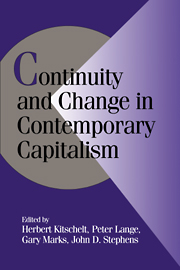Book contents
- Frontmatter
- Contents
- List of Contributors
- Preface
- Introduction
- PART I THE INTERNATIONAL SETTING FOR POLITICAL-ECONOMIC STRATEGIES
- PART II THE DYNAMICS OF DOMESTIC POLITICAL ECONOMIES
- PART III POLITICAL ECONOMY AND DEMOCRATIC COMPETITION
- 10 Politics without Class: Postindustrial Cleavages in Europe and America
- 11 European Social Democracy between Political Economy and Electoral Competition
- 12 Contemporary Christian Democracy and the Demise of the Politics of Mediation
- 13 The Political Economy of Neoliberalism: Britain and the United States in the 1980s
- 14 Movements of the Left, Movements of the Right: Putting the Mobilization of Two New Types of Social Movements into Political Context
- PART IV CONCLUSION
- References
- Index
- Title in the series
10 - Politics without Class: Postindustrial Cleavages in Europe and America
Published online by Cambridge University Press: 05 June 2012
- Frontmatter
- Contents
- List of Contributors
- Preface
- Introduction
- PART I THE INTERNATIONAL SETTING FOR POLITICAL-ECONOMIC STRATEGIES
- PART II THE DYNAMICS OF DOMESTIC POLITICAL ECONOMIES
- PART III POLITICAL ECONOMY AND DEMOCRATIC COMPETITION
- 10 Politics without Class: Postindustrial Cleavages in Europe and America
- 11 European Social Democracy between Political Economy and Electoral Competition
- 12 Contemporary Christian Democracy and the Demise of the Politics of Mediation
- 13 The Political Economy of Neoliberalism: Britain and the United States in the 1980s
- 14 Movements of the Left, Movements of the Right: Putting the Mobilization of Two New Types of Social Movements into Political Context
- PART IV CONCLUSION
- References
- Index
- Title in the series
Summary
Many claim that postindustrial politics is becoming classless. The erosion of materialist and collectivist values favors new social movements, “libertarian,” ecological, or neopopulist parties at the expense of traditional laborist or Christian democratic mass politics. Socialist parties seem particularly vulnerable given their identification with a now vanishing working class. Political success today, it appears, means cultivating a diversified appeal or, alternatively, opting for a particular niche.
This scenario is said to be driven by vast structural changes, such as the declining salience of the capital-labor conflict, accelerated social differentiation, women's economic independence, and educational and job upgrading. In heterogeneous and highly mobile societies, the meaning of class should disappear altogether, and the working class, once the flagship of redistributive collectivism, will be destined to conduct a rearguard defense of past victories. New disadvantaged strata, such as contingent workers, single mothers, long-term unemployed, and welfare dependents, appear too amorphous to coagulate into a viable collective force. The post-war “Fordist” politics were designed around the life conditions of a prototypical standard (male) worker who is now in the minority Postindustrial politics, in contrast, will mirror a society of highly differentiated working lives and families.
How credible is this portrait? Manual workers are obviously declining, and jobs, skills, and occupations are steadily being upgraded. Similarly, the revolution of family structure and women's economic position is beyond doubt.
- Type
- Chapter
- Information
- Continuity and Change in Contemporary Capitalism , pp. 293 - 316Publisher: Cambridge University PressPrint publication year: 1999
- 31
- Cited by



